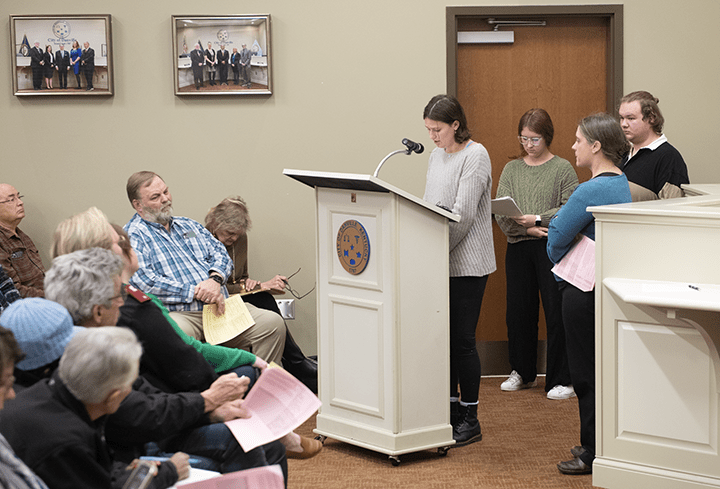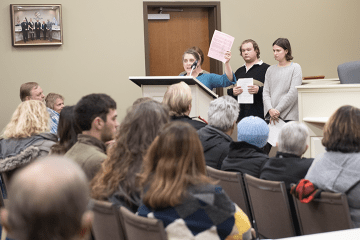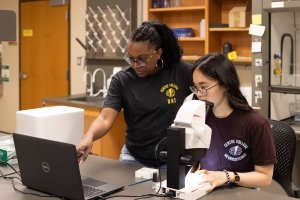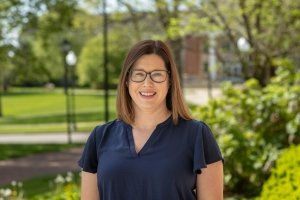Students hone research skills while helping community tackle homelessness

Centre College students conducted field research on the causes of homelessness in the surrounding community, presenting their findings to local leaders tackling the issue.
Above: Students in Kaelyn Wiles’ Sociological Research Methods class present their research during a community forum
Students in Associate Professor of Sociology Kaelyn Wiles’ Sociological Research Methods class are putting their lessons to use helping the local community and those who might need a helping hand.
Combining community-based learning, collaborative research and community engagement, the class tackled identifying the root causes of homelessness in the Danville community, articulating the obstacles to implementing solutions and proposing policy changes that may positively affect this pressing issue.
The 16 students in Wiles’ class presented data collected in collaboration with the Boyle County Agency for Substance Abuse Policy at two forums: the first held on campus, followed by a community forum at Danville’s City Hall. The community presentation, which was attended by the area’s key stakeholders, drew an overflow crowd and broad media attention.
The student researchers’ quantitative methodology involved interviews and surveys conducted throughout the semester at three community organizations serving those without permanent homes: Sts. Peter and Paul Catholic Church, New Hope Food Pantry and the Boyle County Health Department’s Syringe Exchange Program.
“We’re teaching students how to collect data, while at the same time, we’re trying to give back to the community,” Wiles said.

The project is not just a one-semester imitative. Wiles and Centre students have been researching homelessness in the area since 2017. Now those efforts are translating into action by local government to address the issue.
Wiles’ students identified perceptions that people commonly identify as the causes of homelessness, including mental health and substance use disorders, poverty, unemployment and luck. But their data-based research found that those perceptions may only be symptoms of a larger problem.
“The research has shown that homelessness is a housing problem,” said senior Gavin Holt of Lancaster, Kentucky. “While mental health issues and substance abuse disorders are certainly triggers and even risk factors to homelessness, the availability of secure, available, affordable housing is the root issue.”
The students found that while Boyle County focuses on crisis response to the issue, there is a need for more tracking and coordination of services for individuals and families entering or exiting homelessness. To make that possible, the students proposed the creation of a central office or organization to coordinate efforts and regularly provide needs assessments.
In response, Magistrate Steve Sleeper of the Boyle County Fiscal Court announced that, based on this ongoing research, a 12-member task force has been formed to act as an interface with existing resources working to provide support to those experiencing, or at risk of, homelessness, in addition to addressing possible solutions.
“There are a number of other ongoing efforts to address the homelessness issue in our community,” Sleeper said. “We will seek to cooperate and coordinate with those who are also working on the homeless issue so that an abundance of resources may be brought to bear.”



